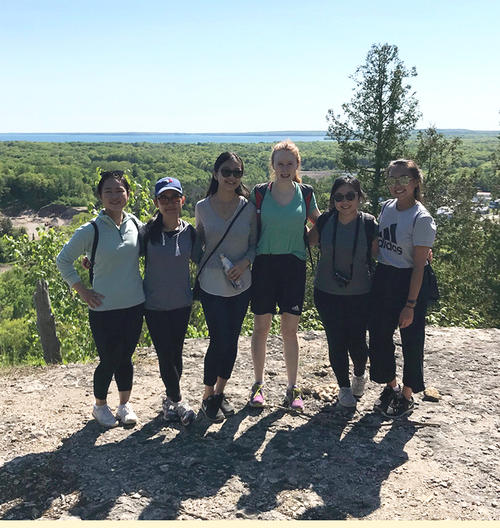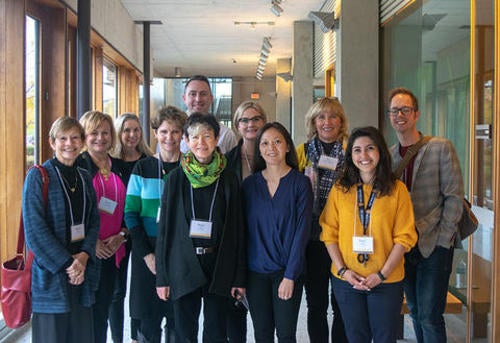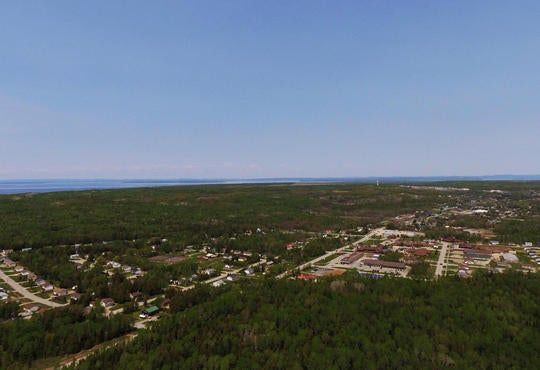How the School, the University and our profession are helping to support reconciliation

Some of the optometry students who provided eye and vision care in Wiikwemikoong, a First Nations community on Manitoulin Island.
This past summer, students and clinicians from the School of Optometry & Vision Science travelled to Manitoulin Island to provide eye care to the children of Wiikwemikoong First Nation. This initiative is a result of a partnership with Wiikwemikoong’s leaders and the Vision Institute of Canada. And it’s one small part of a wider movement toward reconciliation with Indigenous peoples in which the School, the University of Waterloo and our profession all have roles to play.
In 2015, the Truth and Reconciliation Commission of Canada released 94 resolutions aimed at redressing the legacy of residential schools. Among them, Resolutions 24 and 57 call for students training in healthcare to learn about “Aboriginal health issues including the history and legacy of residential schools, the United Nations Declaration on the Rights of Indigenous Peoples, Treaties and Aboriginal rights, and Indigenous teachings and practices.”
In the fall of 2018, the University of Waterloo’s Schools of Optometry & Vision Science, Pharmacy and Public Health and Renison University College’s School of Social Work began work on a response to the TRC’s calls to action. As part of Waterloo’s broader Indigenization Strategy, a committee of faculty and staff members launched a Community of Practice focused on understanding and addressing the continuing impact of racism on Indigenous health.
Supporting reconciliation through health care
The overarching goal of this pilot project is to support reconciliation among those who will train the next generation of healthcare providers and leaders. To that end, the committee developed a workshop entitled “Decolonizing Health Sciences” to help health sciences faculty and staff gain a deeper understanding of cultural safety.
The concept of cultural safety is a key tenet in reconciliation in health care. In fact, it’s embedded in the Declaration of Commitment recently released by the First Nations Health Authority (FNHA) and Federation of Optometric Regulatory Authorities of Canada (FORAC). The Declaration “is intended as a first step in advancing cultural safety and humility among optometrists who deliver vision care to First Nations and Indigenous peoples in Canada.”
The Declaration describes cultural safety as “an outcome based on respectful engagement that recognizes and strives to address power imbalances inherent in the health care system. It results in an environment free of racism and discrimination, where people feel safe when receiving services.”
To create this safe environment, the Declaration states, it’s necessary that we understand our own personal biases and develop a willingness to learn about another’s life experience. This is what the Decolonizing Health Sciences workshop hopes to achieve: to help health care educators move beyond mere awareness of Indigenous culture to a deeper understanding of their patients’ lives.
Cultural safety in the clinic and classroom

Members of the committee who organized the Decolonizing Health Sciences workshop (left to right): Rhona Hanning, Sandra Juutilainen, Colleen McMillan, Rosemary Killeen, Ken Manson, Elaine Lillie, Jenna Bright, Lisa Christian, Alice Schmidt Hanbidge, Katya Jung, and Kyle Scholz
“Before teaching students about personal bias when working with Indigenous people, we as faculty and staff first needed to learn about it ourselves,” says Dr. Lisa Christian, Associate Director of Clinical Education at the School and a member of the committee.
On October 16th, 46 participants attended the “Decolonizing Health Sciences” workshop. Developed with input from Indigenous elders and scholars, Indigenous faculty and staff at Waterloo, and the Ontario Cultural Safety Program, the activities included a smudging ceremony as well as reflections from an elder about his personal interactions with the health care system.
In one active learning exercise, designed to help uncover bias, participants were each assigned an emotion and then asked to work through different scenarios (such as approaching an Indigenous person in a waiting room) and observing how the interaction changed depending on the emotion they were modelling.
“The workshop also helps us address biases which Indigenous people may have toward health care providers as a result of their past experiences,” Dr. Christian says.
Although Indigenous people were the focus of this session, Dr. Christian notes that establishing cultural safety is important when dealing with any marginalized population, in the clinic or the classroom.
That’s why the committee is hopeful that other faculties at the University and health care organizations like FORAC will be interested in adopting the workshop for broader audiences. In the meantime, the committee is evaluating the pilot workshop, with a goal of rolling out the training to additional heath care educators next year while creating a cultural safety course for first-year Optometry, Public Health, Social Work and Pharmacy students by 2021.
Forging the future
Efforts like the Decolonizing Health Sciences workshop and clinics on Manitoulin Island may be small steps toward creating a health care system where everyone can feel safe. But they are steps forward nonetheless.
A quote from the National Centre for Truth and Reconciliation says that “reconciliation is not only about the past; it is about the future that all Canadians will forge together.”
The School of Optometry & Vision Science is proud to help forge that future.







